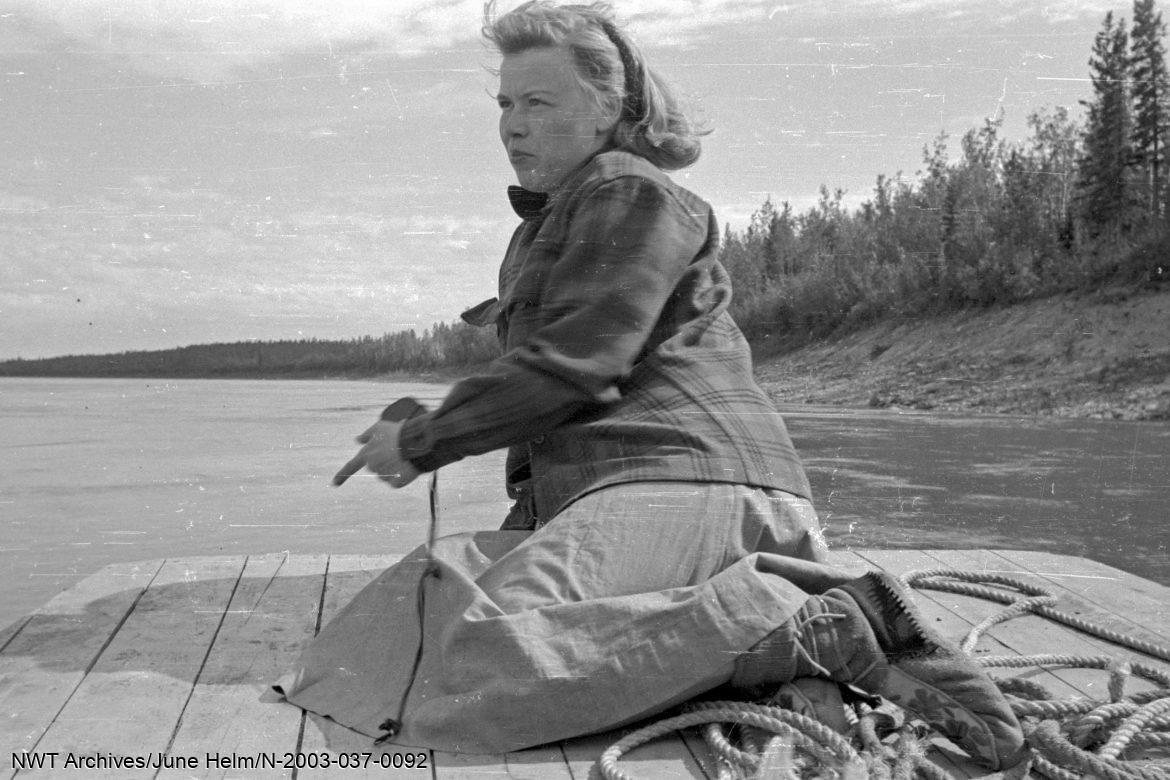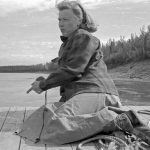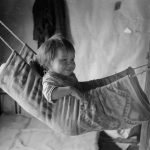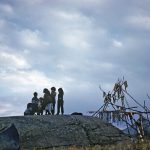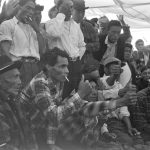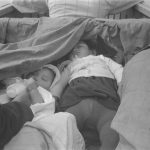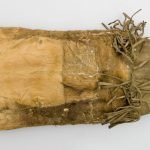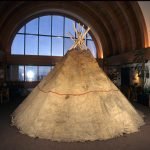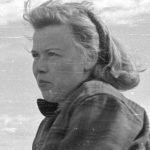1951
June Helm: Northern Anthropologist
June Helm first came to the Northwest Territories in 1951 as a volunteer schoolteacher in the Mackenzie Valley community of Jean Marie River (JMR). She was an anthropology grad student, married to an established archaeologist Scotty MacNeish. He got an appointment to Ottawa at the National Museum of Canada and was doing fieldwork on the Mackenzie River. Helm needed field subjects, so when MacNeish learned that JMR was asking for teachers, she and research associate Teresa Carterette went there to embed themselves in the community for their fieldwork. Her anthropological research in Jean Marie River formed the basis for her doctoral dissertation (1958, University of Chicago) and her 1961 book The Lynx Point People: The Dynamics of a Northern Athapascan Band. She quickly gained a reputation among anthropologists as one of the leading experts on the Dene of the Northwest Territories.
In 1959, Helm’s anthropological research in the North shifted from a general interest in the Dene to more focused work among the Tłı̨chǫ (Dogrib Dene). Many of the Tłı̨chǫ would become her good friends, and their way of life became the focus of her anthropological research. Her studies of Tłı̨chǫ ecology, kinship, and demography resulted in two of her best-known books; Prophecy and Power Among the Dogrib Indians (University of Nebraska Press 1994) and The People of Denendeh: Ethnohistory of the Indians of Canada’s Northwest Territories (University of Iowa Press 2000).
In 1960, June Helm joined the University of Iowa’s Sociology and Anthropology Department. In 1969, she was instrumental in creating a separate Anthropology Department and served as its chair several times. She also served as an expert witness and land claims researcher for the Indian Brotherhood (Dene Nation) and contributed to the Mackenzie Valley Pipeline Inquiry (Berger Inquiry). In 1997, the University of Iowa Museum of Natural History returned a 104-year-old Dogrib caribou skin lodge to the Northwest Territories. June Helm and Natural History Museum director George Schrimper were instrumental in repatriation. Purchased from the Dogrib trading leader Bear Lake Chief in 1893 by naturalist Frank Russell, the original lodge was carefully stored in Iowa for over a century. The lodge returned to the NWT, and the Prince of Wales Northern Heritage Centre by the University of Iowa is likely the only surviving Dogrib caribou skin lodge.
She suffered a severe stroke in 1989 but continued to teach until she retired from the university in 1999. In declining health during the early 2000s, Helm began to organize her field notes, photographs, and audiotapes – almost 50 years of research materials – to send north as a donation to the NWT Archives. June Helm died at the age of 79 on February 5, 2004.
June Helm was one of a long line of southern Euro-North Americans who travelled to the North, recorded, observed, and participated in the lives of Inuit, Dene, Cree, Inuvialuit and Métis. These priests, anthropologists, adventurers and writers recorded moments in time that reflect the period in which they found themselves. Indigenous people are still grappling with the relevance and accuracy of many of the presented ‘facts.’ In 1981, The Smithsonian Institute “Handbook of North American Indians, Volume 6: Subarctic” was published 1981 and edited by June Helm. Within this significant book, Helm and her research associate and Beryl Gillespie, propagated a mistaken idea from previous anthropologists that the Yellowknives Dene vanished due to the 1928 influenza epidemic. The Yellowknives Dene First Nation actively refutes the observation.
